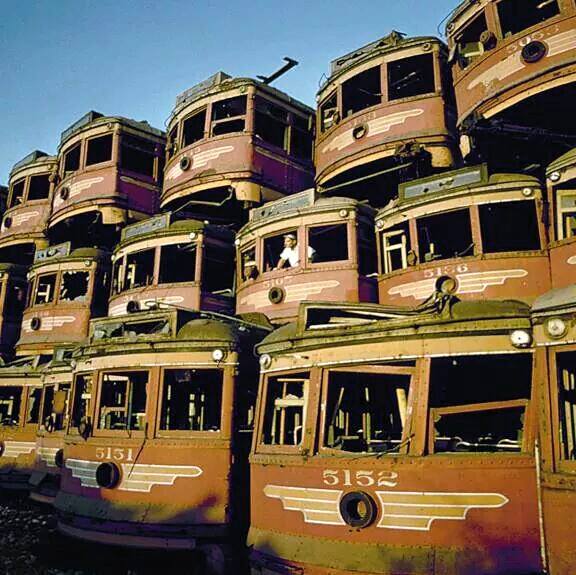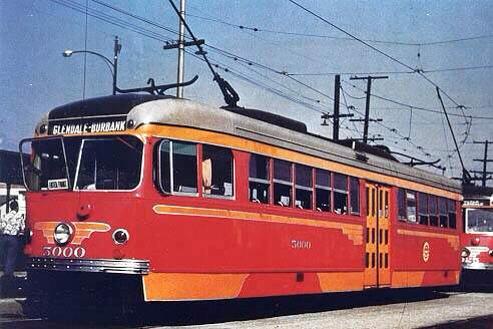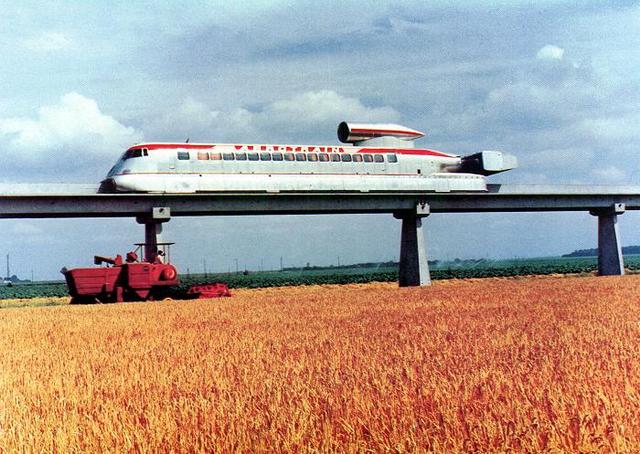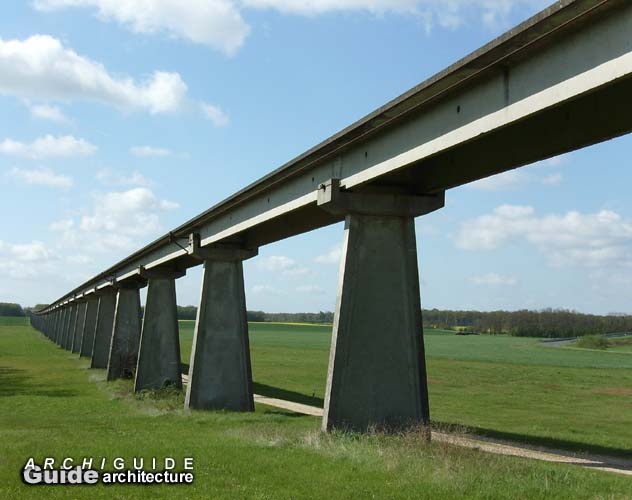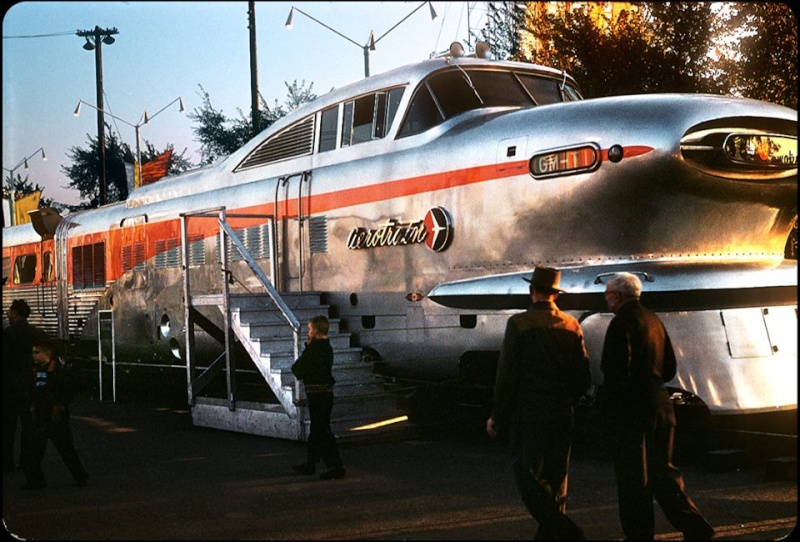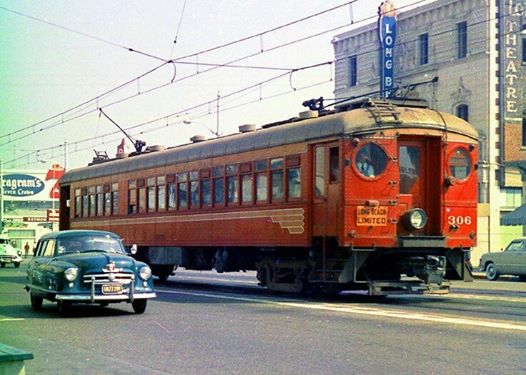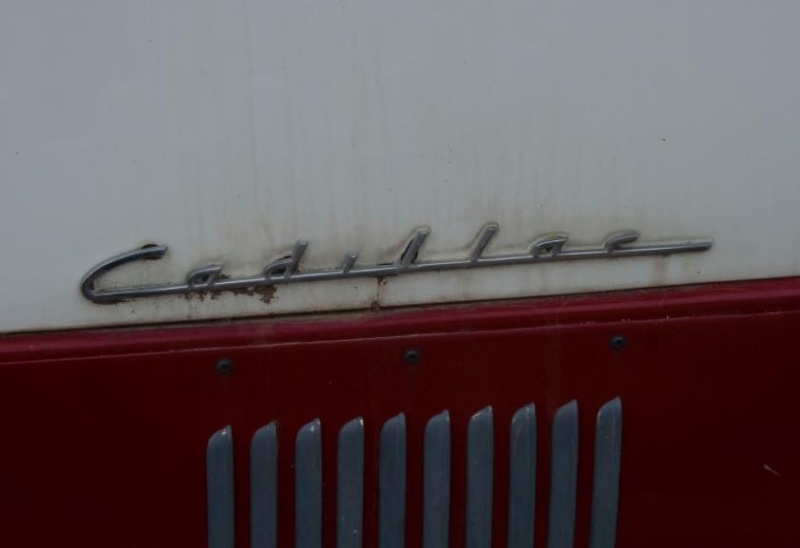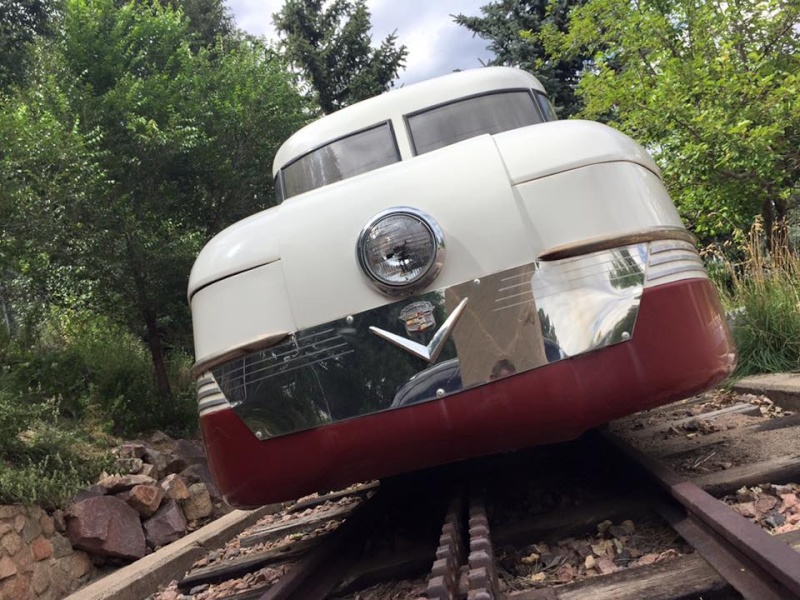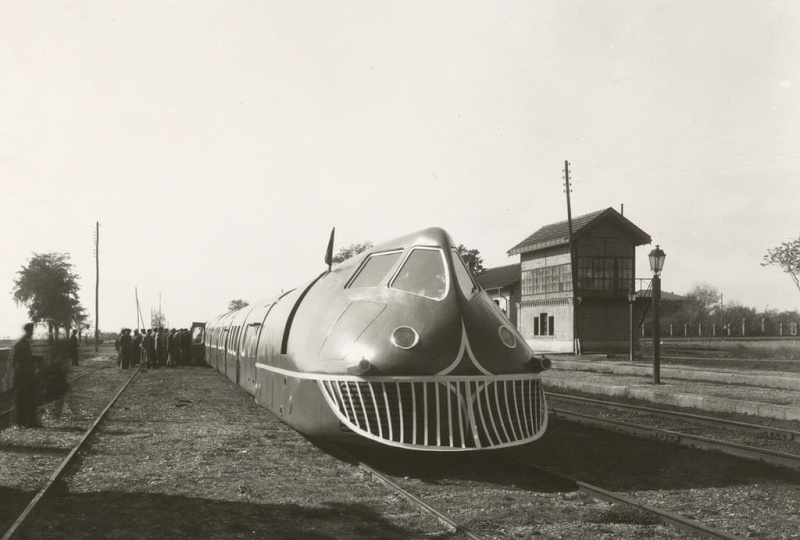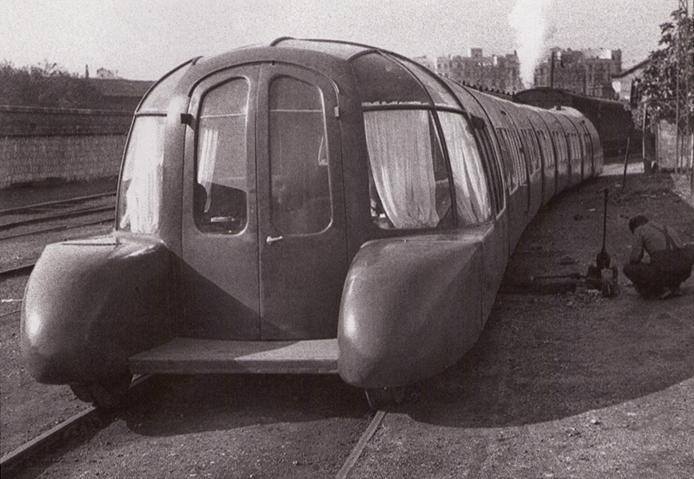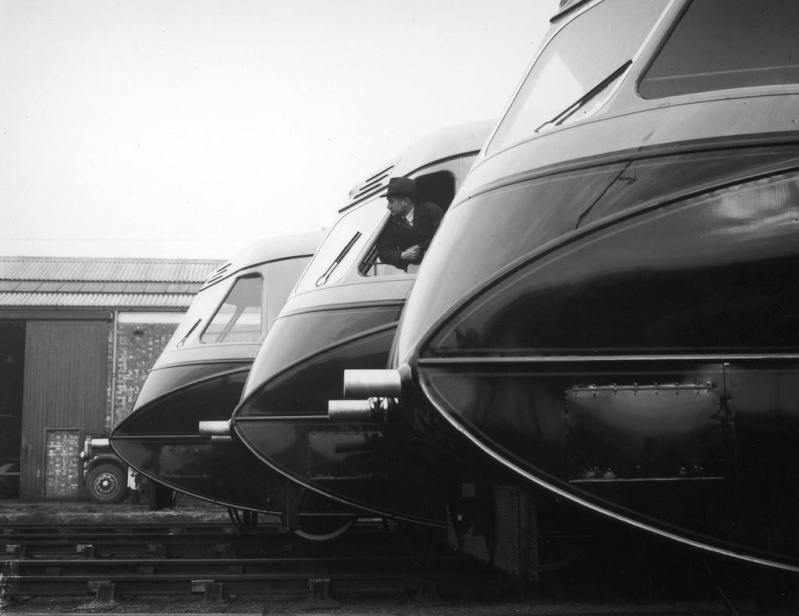Locomotives et trains vintages
+4
Z
Jul
ChevyDave
Predicta
8 participants
Traditional Kustom Hot Rod and Vintage Culture and design :: Sujets Divers & variés / various topics
Page 2 sur 3
Page 2 sur 3 •  1, 2, 3
1, 2, 3 
 Re: Locomotives et trains vintages
Re: Locomotives et trains vintages
J'avais déjà fais un Topic sur ce Turbo-Train en French... : (Pour ceux qui causent pô le rosbif !) : 
1966 — M 497 Black Beetle - Jet Powered Train
Les sociétés de chemin de fer américaines avaient sombré dans une profonde crise. On construisait toujours plus d’autoroutes (Highways) que de plus en plus d’Américains empruntaient dans leurs grosses voitures. Donc, de moins en moins de gens optaient pour le train. Il fallait inventer un train qui serait beaucoup plus rapide et plus confortable qu’une voiture afin de reconquérir le public perdu. Les ingénieurs de la société de chemin de fer New York Central Railways se mirent au travail.


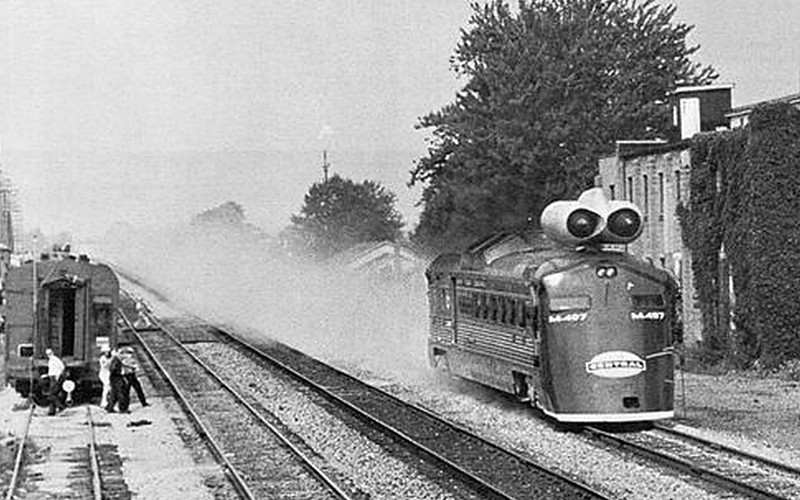
Pour que le développement de ce super train ne dure pas une éternité et n'atteigne pas des sommes colossales, les ingénieurs achetèrent tout simplement ce qui existait déjà et l’assemblèrent : une motrice diesel âgée de 13 ans de type Budd RDC3. Le moteur et les sièges furent retirés. En revanche, ils ne touchèrent pas aux essieux, roues et châssis. La société de chemin de fer acheta deux réacteurs provenant d’un bombardier Convair B-36 à l’armée de l’air américaine. Ils installèrent les réacteurs sur le toit.
Le 23 juillet 1966 fut une date fatidique : le M-497, appelé aussi Black Beetle (Coccinelle Noire), fut aligné sur la piste d’essai. Les ingénieurs de la société de chemin de fer avaient choisi la ligne droite entre Butler dans l’état de l’Indiana et Stryker en Ohio pour leur premier test de ce super train. Imagine un peu l’émerveillement des gens au bord du tracé lorsque d’un seul coup, un train muni d’une rajoute sur le toit ressemblant à deux fusées passa en trombe ! Et dans un vrombissement incroyable ! Le M-497 atteignit exactement 296 kilomètres à l’heure lors de cet essai – un record absolu pour les véhicules de chemin de fer en Amérique.
Peut-être fut-ce le vacarme de l’engin, peut-être fut-ce le coût, peut-être encore fut-ce le voyage, certes rapide, mais tout simplement pas raisonnable pour les passagers : personne ne saura jamais pourquoi le train à réaction n’effectua qu’un seul essai et ne fut jamais construit en série. Toujours est-il que les ingénieurs prouvèrent que les trajets à haute vitesse sur un réseau ferroviaire normal étaient possibles.
Qu'advint-il du train à réaction ? Il fut de nouveau transformé et ramené à son apparence première. La motrice diesel sans fusées sur le toit transporta de nouveau des passagers dans New York City. En 1984, il fut démantelé et mis au rebut. Les turbines furent en revanche utilisées comme soufflante à neige haute puissance devant une locomotive – cette application s’avéra très pratique après quelques corrections. En hiver, les lignes ferroviaires n’étaient en effet plus encombrées par la neige grâce à ces turbines soufflantes.


1966 — M 497 Black Beetle - Jet Powered Train
Les sociétés de chemin de fer américaines avaient sombré dans une profonde crise. On construisait toujours plus d’autoroutes (Highways) que de plus en plus d’Américains empruntaient dans leurs grosses voitures. Donc, de moins en moins de gens optaient pour le train. Il fallait inventer un train qui serait beaucoup plus rapide et plus confortable qu’une voiture afin de reconquérir le public perdu. Les ingénieurs de la société de chemin de fer New York Central Railways se mirent au travail.



Pour que le développement de ce super train ne dure pas une éternité et n'atteigne pas des sommes colossales, les ingénieurs achetèrent tout simplement ce qui existait déjà et l’assemblèrent : une motrice diesel âgée de 13 ans de type Budd RDC3. Le moteur et les sièges furent retirés. En revanche, ils ne touchèrent pas aux essieux, roues et châssis. La société de chemin de fer acheta deux réacteurs provenant d’un bombardier Convair B-36 à l’armée de l’air américaine. Ils installèrent les réacteurs sur le toit.
Le 23 juillet 1966 fut une date fatidique : le M-497, appelé aussi Black Beetle (Coccinelle Noire), fut aligné sur la piste d’essai. Les ingénieurs de la société de chemin de fer avaient choisi la ligne droite entre Butler dans l’état de l’Indiana et Stryker en Ohio pour leur premier test de ce super train. Imagine un peu l’émerveillement des gens au bord du tracé lorsque d’un seul coup, un train muni d’une rajoute sur le toit ressemblant à deux fusées passa en trombe ! Et dans un vrombissement incroyable ! Le M-497 atteignit exactement 296 kilomètres à l’heure lors de cet essai – un record absolu pour les véhicules de chemin de fer en Amérique.
Peut-être fut-ce le vacarme de l’engin, peut-être fut-ce le coût, peut-être encore fut-ce le voyage, certes rapide, mais tout simplement pas raisonnable pour les passagers : personne ne saura jamais pourquoi le train à réaction n’effectua qu’un seul essai et ne fut jamais construit en série. Toujours est-il que les ingénieurs prouvèrent que les trajets à haute vitesse sur un réseau ferroviaire normal étaient possibles.
Qu'advint-il du train à réaction ? Il fut de nouveau transformé et ramené à son apparence première. La motrice diesel sans fusées sur le toit transporta de nouveau des passagers dans New York City. En 1984, il fut démantelé et mis au rebut. Les turbines furent en revanche utilisées comme soufflante à neige haute puissance devant une locomotive – cette application s’avéra très pratique après quelques corrections. En hiver, les lignes ferroviaires n’étaient en effet plus encombrées par la neige grâce à ces turbines soufflantes.

_________________


 Si vis pacem, para bellum !....................................................
Si vis pacem, para bellum !....................................................
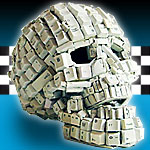
Magic-Tonio- Messages : 190
Date d'inscription : 27/02/2013
 Re: Locomotives et trains vintages
Re: Locomotives et trains vintages
_________________
We don't care the People Says , Rock 'n' roll is here to stay - Danny & the Juniors - 1958
 Re: Locomotives et trains vintages
Re: Locomotives et trains vintages
_________________
Rien ne vaut le son du V8 le soir au coin du bois.
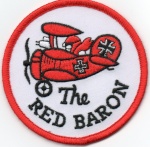
The Red Baron- Messages : 741
Date d'inscription : 01/07/2014
Age : 56
Localisation : Bordeaux
 Re: Locomotives et trains vintages
Re: Locomotives et trains vintages
Elle existe toujours la structure . 
Pis je monte en Alsace bientôt, mais je passe pas par Orléans ...

Pis je monte en Alsace bientôt, mais je passe pas par Orléans ...

ChevyDave- Messages : 3899
Date d'inscription : 11/11/2012
 Re: Locomotives et trains vintages
Re: Locomotives et trains vintages
_________________
We don't care the People Says , Rock 'n' roll is here to stay - Danny & the Juniors - 1958
 The LIMTV (linear induction motor test vehicle), USA 1973
The LIMTV (linear induction motor test vehicle), USA 1973
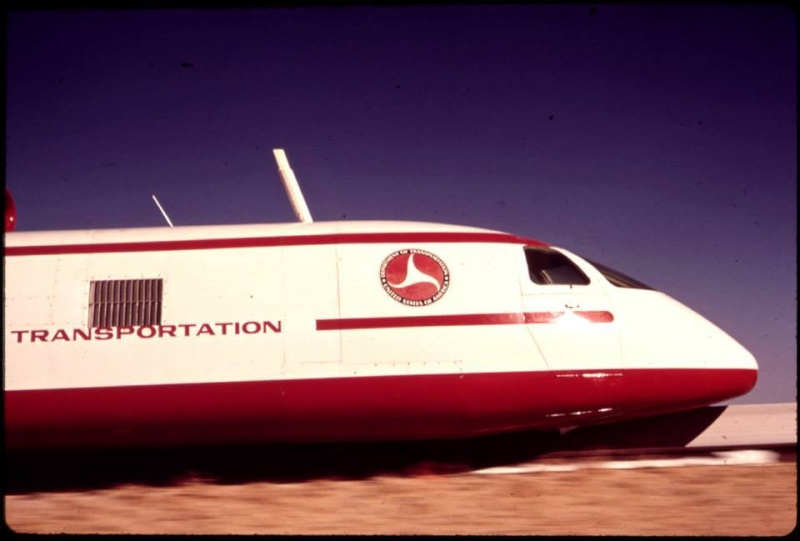
The LIMTV (linear induction motor test vehicle) is tested at the Department of Transportation’s high speed ground test center near Pueblo, Colorado, in March of 1973. The experimental vehicle is designed to operate at speeds up to 250 miles per hour, using electro-magnetic forces for noiseless propulsion." (Bruce McAllister/NARA)



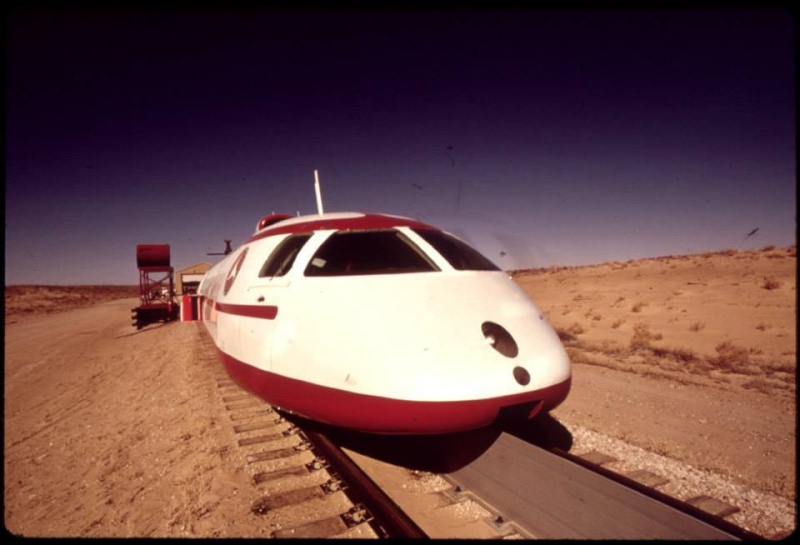
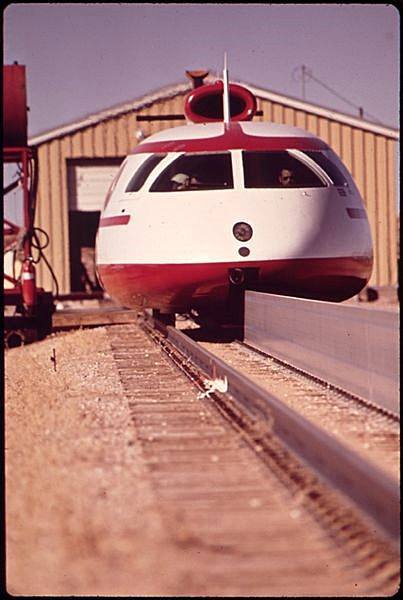
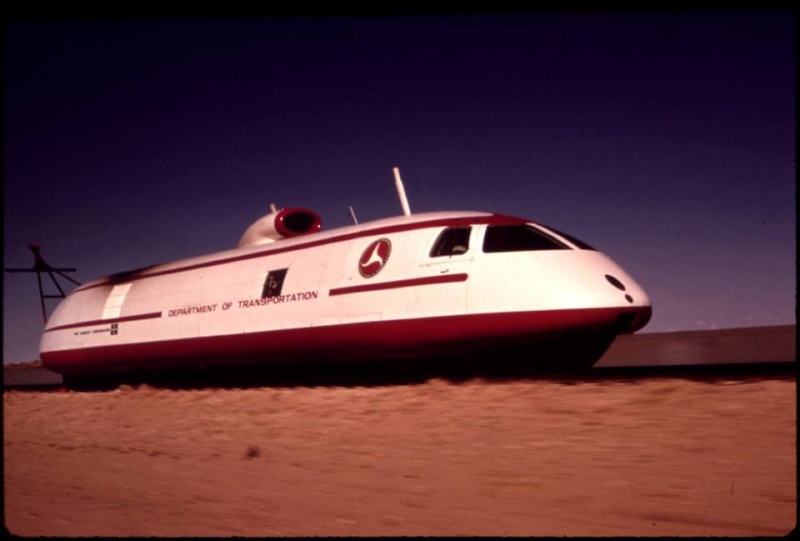
_________________
We don't care the People Says , Rock 'n' roll is here to stay - Danny & the Juniors - 1958
 Re: Locomotives et trains vintages
Re: Locomotives et trains vintages
_________________
We don't care the People Says , Rock 'n' roll is here to stay - Danny & the Juniors - 1958
 Re: Locomotives et trains vintages
Re: Locomotives et trains vintages
_________________
We don't care the People Says , Rock 'n' roll is here to stay - Danny & the Juniors - 1958
 Re: Locomotives et trains vintages
Re: Locomotives et trains vintages
_________________
We don't care the People Says , Rock 'n' roll is here to stay - Danny & the Juniors - 1958
 Re: Locomotives et trains vintages
Re: Locomotives et trains vintages
_________________
We don't care the People Says , Rock 'n' roll is here to stay - Danny & the Juniors - 1958
 Re: Locomotives et trains vintages
Re: Locomotives et trains vintages
_________________
We don't care the People Says , Rock 'n' roll is here to stay - Danny & the Juniors - 1958
 Re: Locomotives et trains vintages
Re: Locomotives et trains vintages
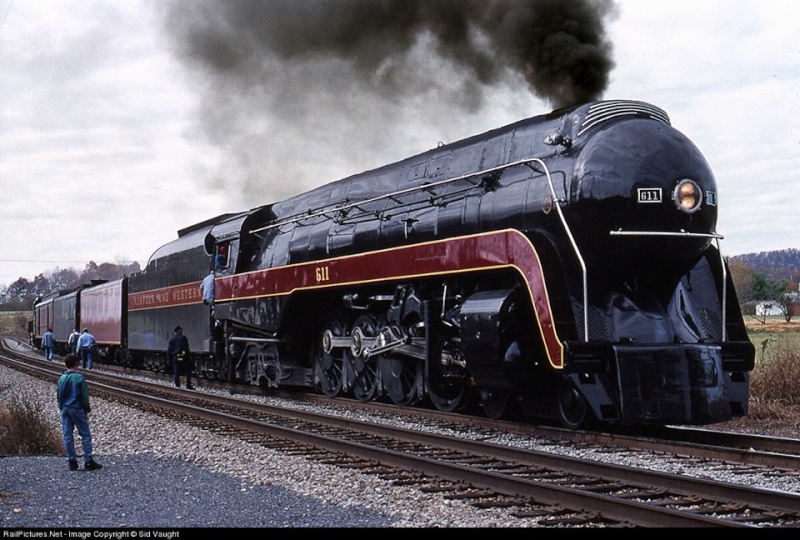
As a kid I was huge into these two locomotives, the Norfolk and western 1950 j-class 611 and the 1940's New York central Hudson. Got to ride in the n&w 611 and have a collection of scale models and magazines of it. The sheer mass and size plus the raw power of these trains and add their sleek deco style just always interested me. That was a ride to remember as a 9 year old boy. Although 611 is no longer in service, I'd love to go say

_________________
We don't care the People Says , Rock 'n' roll is here to stay - Danny & the Juniors - 1958
 Re: Locomotives et trains vintages
Re: Locomotives et trains vintages
_________________
We don't care the People Says , Rock 'n' roll is here to stay - Danny & the Juniors - 1958
 Re: Locomotives et trains vintages
Re: Locomotives et trains vintages
_________________
We don't care the People Says , Rock 'n' roll is here to stay - Danny & the Juniors - 1958
 Re: Locomotives et trains vintages
Re: Locomotives et trains vintages
Motorisé par un V8 de la marque?
_________________
Rien ne vaut le son du V8 le soir au coin du bois.

The Red Baron- Messages : 741
Date d'inscription : 01/07/2014
Age : 56
Localisation : Bordeaux
 Re: Locomotives et trains vintages
Re: Locomotives et trains vintages
Je ne sais pas mais probableThe Red Baron a écrit:Motorisé par un V8 de la marque?
_________________
We don't care the People Says , Rock 'n' roll is here to stay - Danny & the Juniors - 1958
 The ALWEG Monorail
The ALWEG Monorail
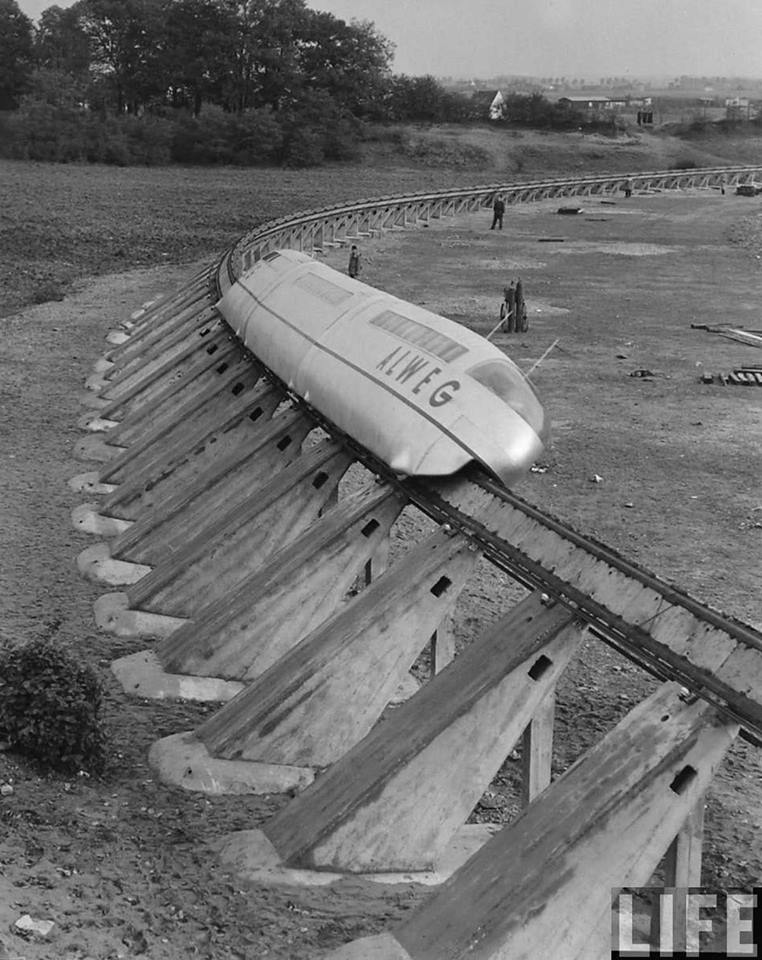
Photos by Ralph Crane, 1952
Alweg was founded by Swedish industrial magnate Dr. Axel Lennart Wenner-Gren in January 1953 as Alweg-Forschung, GmbH (Alweg Research Corporation), based in Fühlingen, Germany, near Cologne.The company was an outgrowth of the Verkehrsbahn-Studiengesellschaft (Transit Railway Study Group), which had already presented its first monorail designs and prototypes in the previous year. The Alweg name is an acronym of Dr. Wenner-Gren's name (Axel Lennart WEnner-Gren).

Alweg is best remembered for developing the original Disneyland Monorail System, opening in 1959, and the Seattle Center Monorail, opened for the 1962 Century 21 Exposition.

Both systems remain operational, with the Seattle Center Monorail still using the original Alweg trains which have traveled over one million miles.
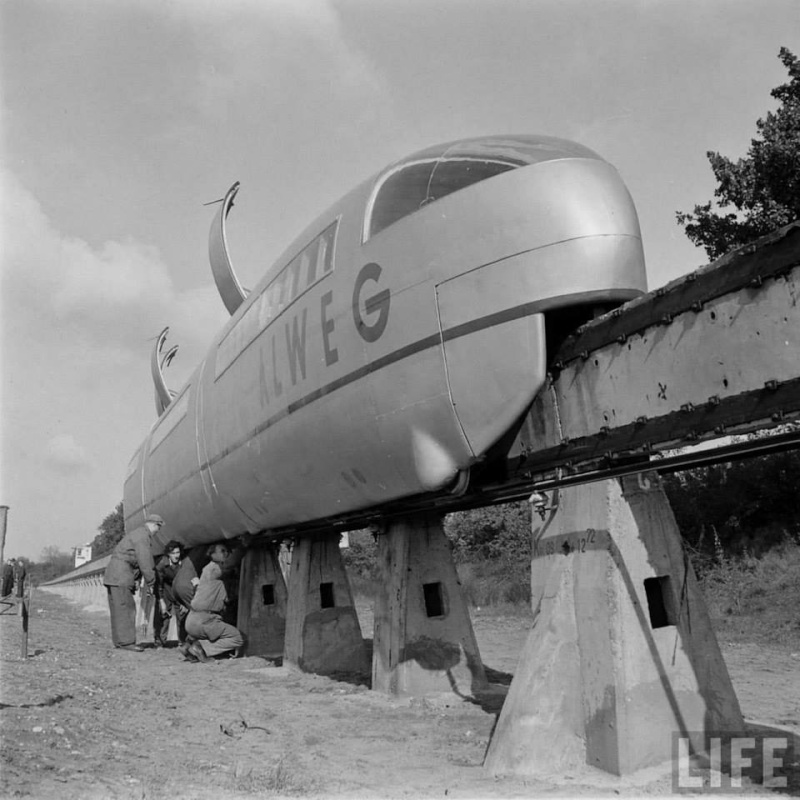
In 1963, Alweg proposed to the city of Los Angeles a monorail system that would be designed, built, operated and maintained by Alweg.Alweg promised to take all financial risk from the construction, and the system would be repaid through fares collected. The City Council rejected the proposal in favor of no transit at all.

Alweg's technology was licensed in 1960 by Hitachi Monorail, which continues to construct monorails based on Alweg technology around the world. The world's busiest monorail line, the Tokyo Monorail, was completed in 1964 by what was then the Hitachi-Alweg division of Hitachi.After Alweg ran into financial difficulties, Alweg's German operations were taken over by Krupp. Alweg's Seattle subsidiary Wegematic ceased operations in 1964, but some of the technology used in the Disneyland monorail was eventually acquired by Canadian company Bombardier.
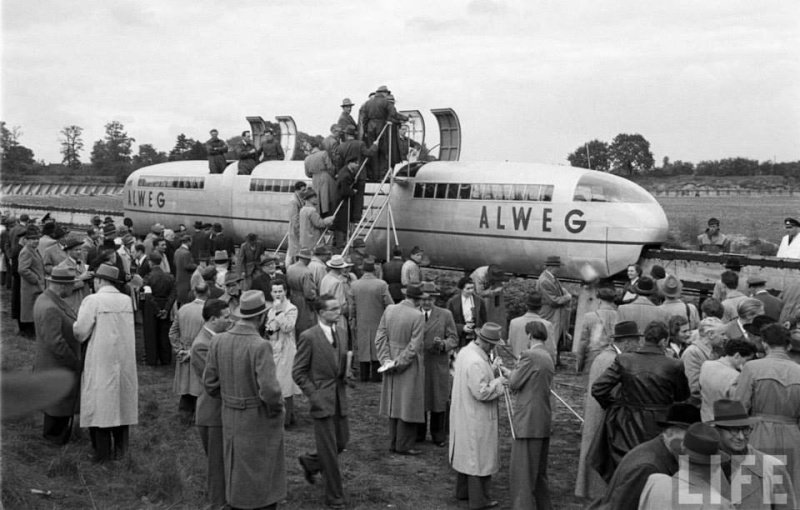
_________________
We don't care the People Says , Rock 'n' roll is here to stay - Danny & the Juniors - 1958
 GM’s “Dream Train”: The Aerotrain
GM’s “Dream Train”: The Aerotrain

Written by Toby Roan
By the mid-Fifties, passenger rail in the United States was a mess. The public’s increased use of automobiles and stiff competition from airlines and bus service had sent medium-distance passenger revenues into a tailspin. Despite huge investments in improved equipment and facilities, the railroad industry was losing about $700 million a year on passenger service. There was simply no way they could charge the fares necessary to put them back in the black. It was time to rethink the passenger train.
The plan was to develop a stylish, comfortable, high-speed train (top speed: 100 miles per hour) with low fares to lure passengers back onto the tracks. And with this new train being lightweight and fuel-efficient, the railroads should be able to return to profitable passenger service.

General Motors was approached to create such a train. And its Electro-Motive Division came back with the Aerotrain. One of its chief designers was Charles “Chuck” Jordan. An MIT graduate brought to General Motors by Harley Earl in 1948, Jordan was responsible for Chevrolet’s Cameo Carrier pickup in 1954, would be the primary designer of the 1958 Corvette, and would be named Cadillac’s Chief of Design in 1959.
A futuristic blending of Fifties highway and railway technology (with maybe a little Buck Rogers thrown in for good measure), the Aerotrain fits right in with the GM concept cars of the period. In particular, the 1951 Buick LeSabre (a swanky concept car that became Harley Earl’s daily driver) seems to have been a big influence on the styling of the Aerotrain, which featured a wraparound windshield and multiple headlights.
Called the LWT-12, for “light weight 1,200 horsepower,” each Aerotrain was powered by a single GM 1,200-horsepower Diesel electric propulsion unit. Thanks to its light weight and low center of gravity, it was felt that 1,200 was enough horsepower. It wasn’t. Compared to other trains, it was pitifully underpowered. But the reduction in weight and horsepower meant that the Aerotrain used only 1.3 gallons of fuel per mile at top speed.
Each of the Aerotrain’s 10 passenger cars was basically a modified bus body from GM’s Motor Coach Division. The observation car even had what appear to be taillights and fins, looking much like a Chevy Nomad station wagon. Two of the 40-passenger non-articulated cars weighed less than one standard 80-passenger car. Headroom was drastically cut and aluminum replaced steel whenever possible. It all sat on a steel underframe, with single-axle trucks and an air suspension system very similar to what was found on GM buses. Unfortunately, what made for a nice, comfortable bus ride would not have the same success on rails.
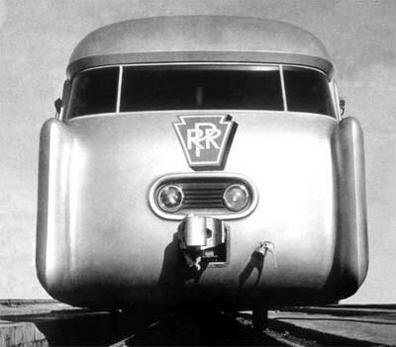
GM’s ads promised “an entirely new concept of speed, comfort, safety and economy.” New York Central’s copywriters weren’t as restrained in their ads for the “dream train,” calling it “a fast, lightweight new train that can revolutionize rail travel, increase employment, and strengthen our national defense.” The hype worked. People were eager to experience the Aerotrain, and they got their first glimpse at the GM Powerama in 1955.
Two Aerotrain prototypes were built. One went to Pennsylvania Railroad; the second became New York Central’s “Great Lakes Aerotrain,” providing nonstop service between Chicago and Detroit. A third LWT-12 was built to pull another attempt at a lightweight passenger train, Rock Island’s Talgo “Jet Rocket.”


It didn’t take long for the trouble to start. It quickly became apparent that the Aerotrains were underpowered and prone to mechanical problems. Passengers missed the spacious comfort of standard streamlined trains, finding the downsized Aerotrain “buses” confining. And with the shortened wheelbase and air suspension, the ride was terrible at anything close to top speed. After only a year or so, Pennsy and New York Central returned their Aerotrains to GM. Thanks, but no thanks.

Next up was Union Pacific, whose “City Of Las Vegas” Aerotrain made the run between L.A. and Las Vegas loaded with gamblers. It needed a helper to surmount Cajon Pass.
Before long, both Aerotrain prototypes were sold to the Rock Island Line. (They’d also end up with that third LWT-12 built for the Talgo.) Condemned to commuter service, where it was felt the slower speeds would ensure a smoother ride, the Aerotrains tooled around the Chicago suburbs until being retired in 1966. After only 10 years, the train of the future had come to the end of the road.
Today, you can pay your respects to the Aerotrains at the National Railroad Museum in Green Bay (read article), Wisconsin (they have Number 2) and the Museum Of Transportation in St. Louis. The MOT has an engineless LWT-12 and two cars, which are currently undergoing cosmetic restoration (thanks to a hefty donation from the Gateway Division NMRA).
Written by Toby Roan
http://www.discoverlivesteam.com/magazine/31/31.html
_________________
We don't care the People Says , Rock 'n' roll is here to stay - Danny & the Juniors - 1958
 Re: Locomotives et trains vintages
Re: Locomotives et trains vintages
The General Motors Aerotrain was an experimental direction taken by GM in the mid-1950’s, it was designed by legendary car-man Chuck Jordan, the classic 50’s American car influence is clearly apparent in its conceptualisation from tip to tail.
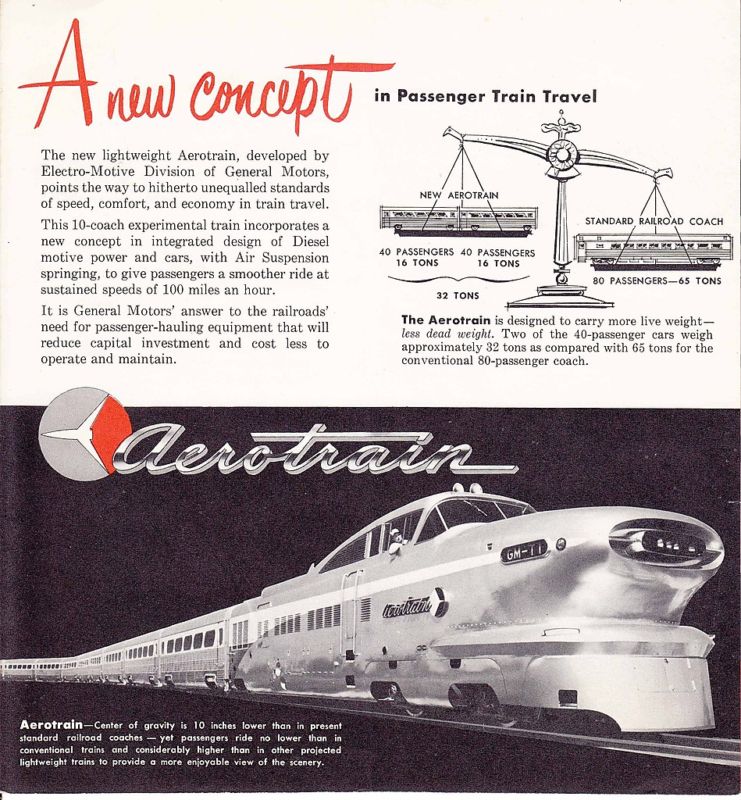
The engine was attached to a series of GM built 40-seat intercity bus coach bodies that had been modified to run on an air-suspension system, the ride quality was infamous for being a little on the rough side and sadly the Aerotrain remained a sole unit, destined to be a curiosity in GM’s long and varied history.
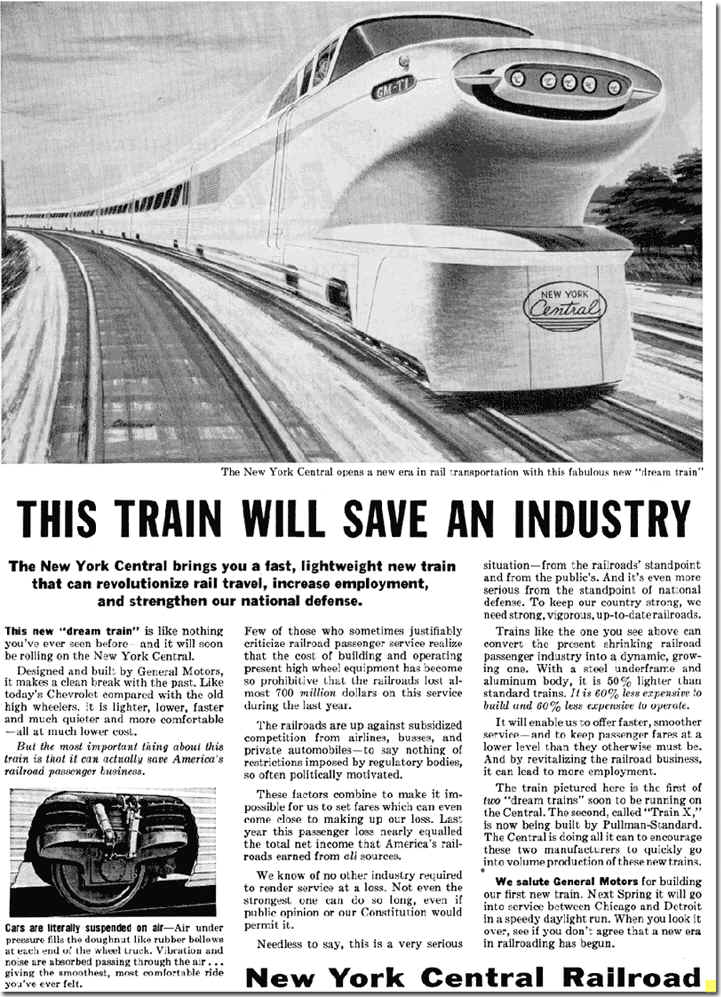

The engine was attached to a series of GM built 40-seat intercity bus coach bodies that had been modified to run on an air-suspension system, the ride quality was infamous for being a little on the rough side and sadly the Aerotrain remained a sole unit, destined to be a curiosity in GM’s long and varied history.

_________________
We don't care the People Says , Rock 'n' roll is here to stay - Danny & the Juniors - 1958
 Re: Locomotives et trains vintages
Re: Locomotives et trains vintages
_________________
We don't care the People Says , Rock 'n' roll is here to stay - Danny & the Juniors - 1958
 Re: Locomotives et trains vintages
Re: Locomotives et trains vintages
General Motors (EMD) "Aerotrain"
The Aerotrain was a streamlined trainset introduced by General Motors Electro-Motive Division in the mid-1950s. Like all of GM's great body designs of this mid-century era, this futuristic train was first brought to life in GM's Styling Section. Chuck Jordan was in charge of designing the Aero Train as Chief Designer of Special Projects.
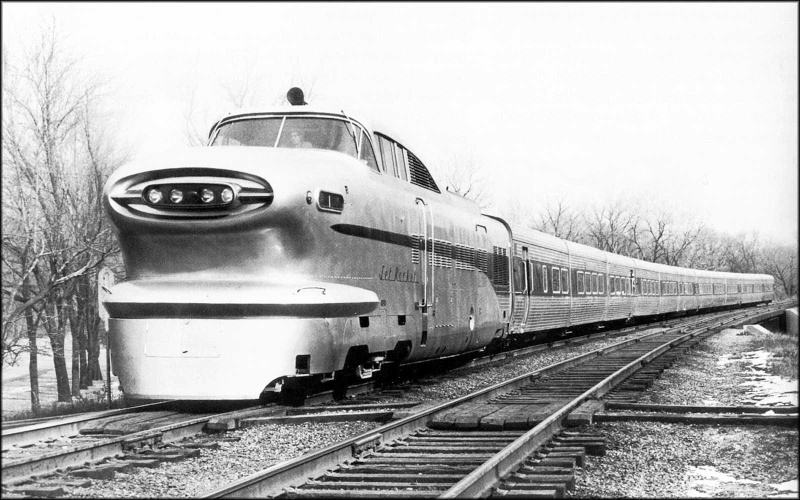
GM's "lightweight with a heavyweight future" was introduced at a time when U.S. passenger train revenues were steadily declining due to competition from airlines and private automobile travel. Although it featured an eye-catching, streamlined design, the Aerotrain failed to capture the imagination of the American public.

The cars, based on GM bus designs and using an air cushioning system, were rough riding and not very comfortable for the passengers. The design of the underpowered experimental EMD LWT12 locomotive section rendered even routine maintenance extremely difficult and time-consuming. Eventually the three trainsets that were manufactured were retired after only a decade's use in 1966.
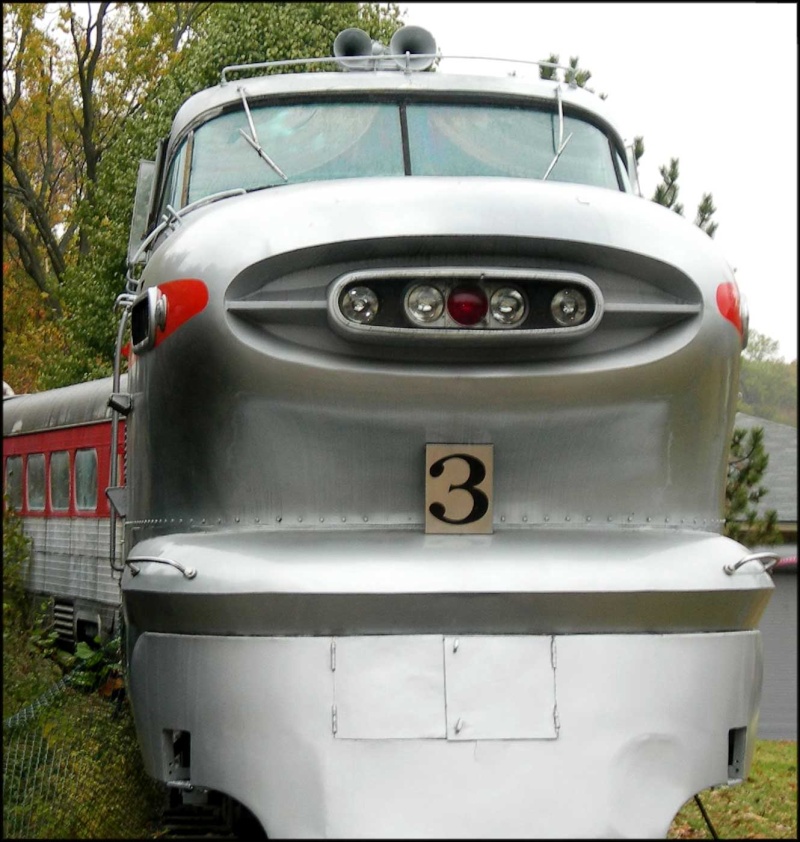
Pictured in 2005 the preserved Chicago, Rock Island & Pacific (Rock Island Line), GM Aerotrain at the National Transportation Museum in St Louis, Missouri.
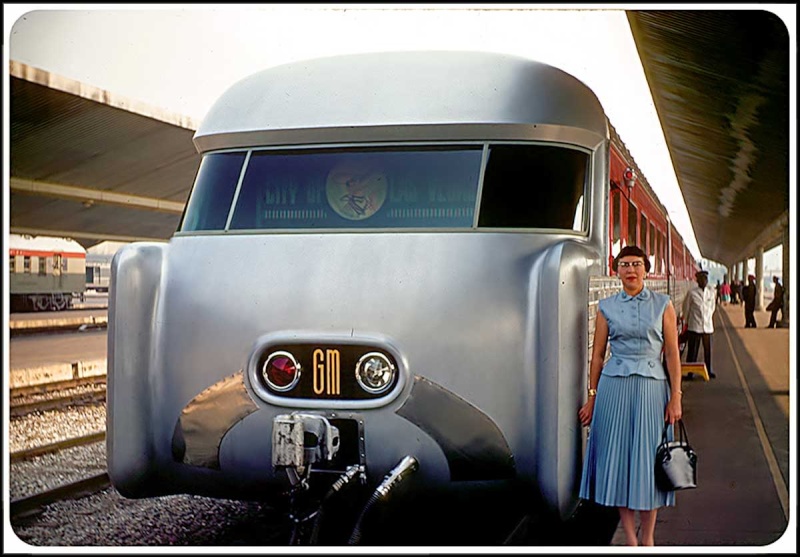
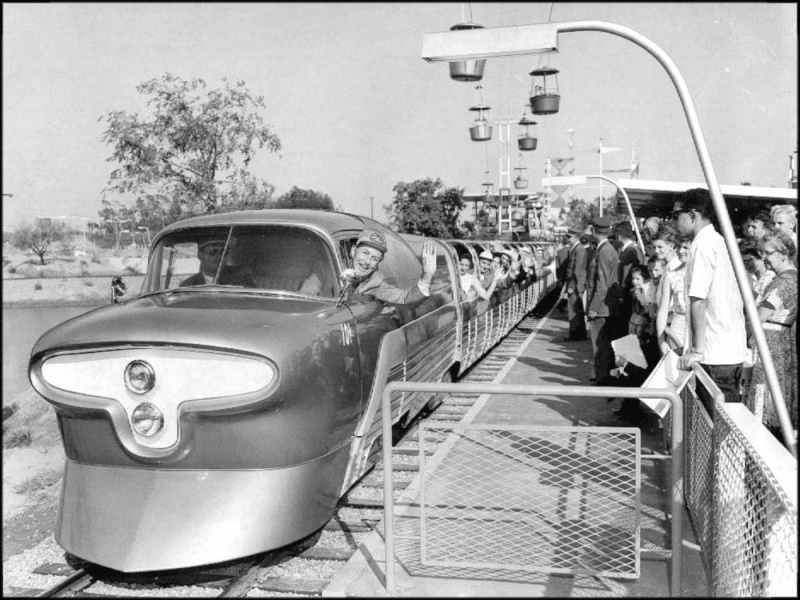
And of course this post would not be complete if we did not show a picture of the Disneyland Viewliner as it prepares to depart the Tommorowland Station in 1957, with Walt Disney at the controls. As you can see, the Viewliner's design was inspired by the Aerotrain.
http://viewlinerltd.blogspot.fr/2008/06/general-motors-emd-aerotrain.html
The Aerotrain was a streamlined trainset introduced by General Motors Electro-Motive Division in the mid-1950s. Like all of GM's great body designs of this mid-century era, this futuristic train was first brought to life in GM's Styling Section. Chuck Jordan was in charge of designing the Aero Train as Chief Designer of Special Projects.

GM's "lightweight with a heavyweight future" was introduced at a time when U.S. passenger train revenues were steadily declining due to competition from airlines and private automobile travel. Although it featured an eye-catching, streamlined design, the Aerotrain failed to capture the imagination of the American public.

The cars, based on GM bus designs and using an air cushioning system, were rough riding and not very comfortable for the passengers. The design of the underpowered experimental EMD LWT12 locomotive section rendered even routine maintenance extremely difficult and time-consuming. Eventually the three trainsets that were manufactured were retired after only a decade's use in 1966.

Pictured in 2005 the preserved Chicago, Rock Island & Pacific (Rock Island Line), GM Aerotrain at the National Transportation Museum in St Louis, Missouri.


And of course this post would not be complete if we did not show a picture of the Disneyland Viewliner as it prepares to depart the Tommorowland Station in 1957, with Walt Disney at the controls. As you can see, the Viewliner's design was inspired by the Aerotrain.
http://viewlinerltd.blogspot.fr/2008/06/general-motors-emd-aerotrain.html
_________________
We don't care the People Says , Rock 'n' roll is here to stay - Danny & the Juniors - 1958
 Re: Locomotives et trains vintages
Re: Locomotives et trains vintages
_________________
We don't care the People Says , Rock 'n' roll is here to stay - Danny & the Juniors - 1958
 Re: Locomotives et trains vintages
Re: Locomotives et trains vintages
_________________
We don't care the People Says , Rock 'n' roll is here to stay - Danny & the Juniors - 1958
 Re: Locomotives et trains vintages
Re: Locomotives et trains vintages
_________________
We don't care the People Says , Rock 'n' roll is here to stay - Danny & the Juniors - 1958
Page 2 sur 3 •  1, 2, 3
1, 2, 3 
 Sujets similaires
Sujets similaires» Trains en jouet
» lames ressorts trains avant 403 peugeot
» Camions vintages
» publicités vintages 50 60 70
» Boites à couture vintages
» lames ressorts trains avant 403 peugeot
» Camions vintages
» publicités vintages 50 60 70
» Boites à couture vintages
Traditional Kustom Hot Rod and Vintage Culture and design :: Sujets Divers & variés / various topics
Page 2 sur 3
Permission de ce forum:
Vous ne pouvez pas répondre aux sujets dans ce forum
 Connexion
Connexion
